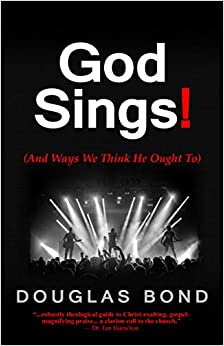
Douglas Bond
Reviewed by: Jonathan Landry Cruse
God Sings! (And Ways We Think He Ought To), by Douglas Bond. Inkblots, 2019. Paperback, 270 pages, $13.75 (Amazon). Reviewed by OP pastor Jonathan Landry Cruse.
The title of the book, and its driving theme, are derived from Zephaniah 3:17, “The LORD your God is in your midst, a mighty one who will save; he will rejoice over you with gladness; he will quiet you by his love; he will exult over you with loud singing.” This line leads author Douglas Bond, and us, to wonder in fascination about the being of God: “What must God’s singing sound like? … The richest, deepest, most resonate bass voice; the most transcendent soprano, never shrill, never harsh, never shattering, but power and sweetness emanating out of divine perfection. The mere speculation boggles the mind” (13). Bond reminds us that as God’s image bearers “we do in miniature what he has done and continues to do in infinite grandeur” (13). As a church, and with our singing in particular, we are forced to ask ourselves, how are we doing with that?
In this collection of essays, Bond assesses the state of today’s worship and argues compellingly for a recovery of God-honoring, artistically-excellent texts and tunes in the church. It would be an oversimplification to say this book simply pits the traditionalists versus the contemporary movement. In fact, Bond would disavow the moniker “traditionalist” (47). Rather, the position that he argues for is one he convincingly argues is found in Scripture itself. The form, substance, and style for congregational singing is guided by the Word of God: “one could argue that the entire book of Psalms gives us the most comprehensive model of how we are to enter in the presence of God in our sung worship” (17). Also to guide our practices, frequent reference is made to how Hebrews roots our worship in the reality of God as a “consuming fire” (Heb. 12:28–29).
Bond does, however, reveal the ways in which the contemporary Christian music scene has largely missed the mark of biblical standards for worship music. He highlights how some of the most popular modern worship songs lack a theological and scriptural foundation (chapter 7) and how entertainment is driving our decisions about church (chapter 8). He notes the paucity of good poets serving the church today, with the result that many of the newer texts lack the aesthetic of “unity and progression” (139)—foundational elements in both English and biblical poetry that preserve us from vain repetition (chapter 9). Bond cautions against making church “hip” rather than “holy,” or “cool” rather than “Christian” (227): “It’s washing down boeuf bourguignon with Kool-Aid to wed the deep truths of redemption with music designed to amuse and entertain” (150).
Although it is undoubtedly a severe critique of a dominant movement in today’s church, these pages are saturated with grace, which makes the book far more palatable than many other polemical works. I found it to be an even-handed yet witty treatment of a delicate subject—as engaging as it is important. So, take up and read—or better, take up and sing!
December 28, 2025
December 21, 2025
December 14, 2025
December 07, 2025
November 30, 2025
November 23, 2025
November 16, 2025
© 2026 The Orthodox Presbyterian Church